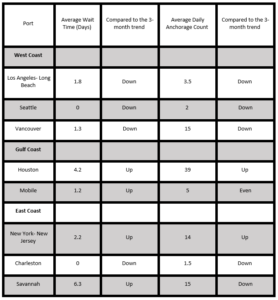The International Longshore and Warehouse Union (ILWU) and the Pacific Maritime Association (PMA) continue to work behind closed doors to reach a new labor agreement after the previous agreement expired on July 1. While the expiration has opened the door to potential port disruptions in the form of lockouts or strikes, neither side has given any indication that a disruption could take place in the coming weeks.
Despite the absence of open hostility, shippers continue to move cargoes to alternative ports considering the uncertain shipping environment. The Ports of Los Angeles and Long Beach have seen an increase in waiting times and vessel counts in the last few weeks representing an increase in traffic; however, cargo volumes continue the trend of moving to East and Gulf Coast ports
The uncertainty around the ongoing negotiations has resulted in oscillating wait times at the port of Los Angeles-Long Beach. Overall, North American West Coast ports have seen a slight increase in waiting times on average compared to the previous week.
East Coast Ports combine for the longest waiting times although the combined waiting time has fallen slightly compared to last week. The Gulf Coast ports of Houston and Mobile have continued to see heavy congestion while the Port of Mobile saw its waiting times fall.
